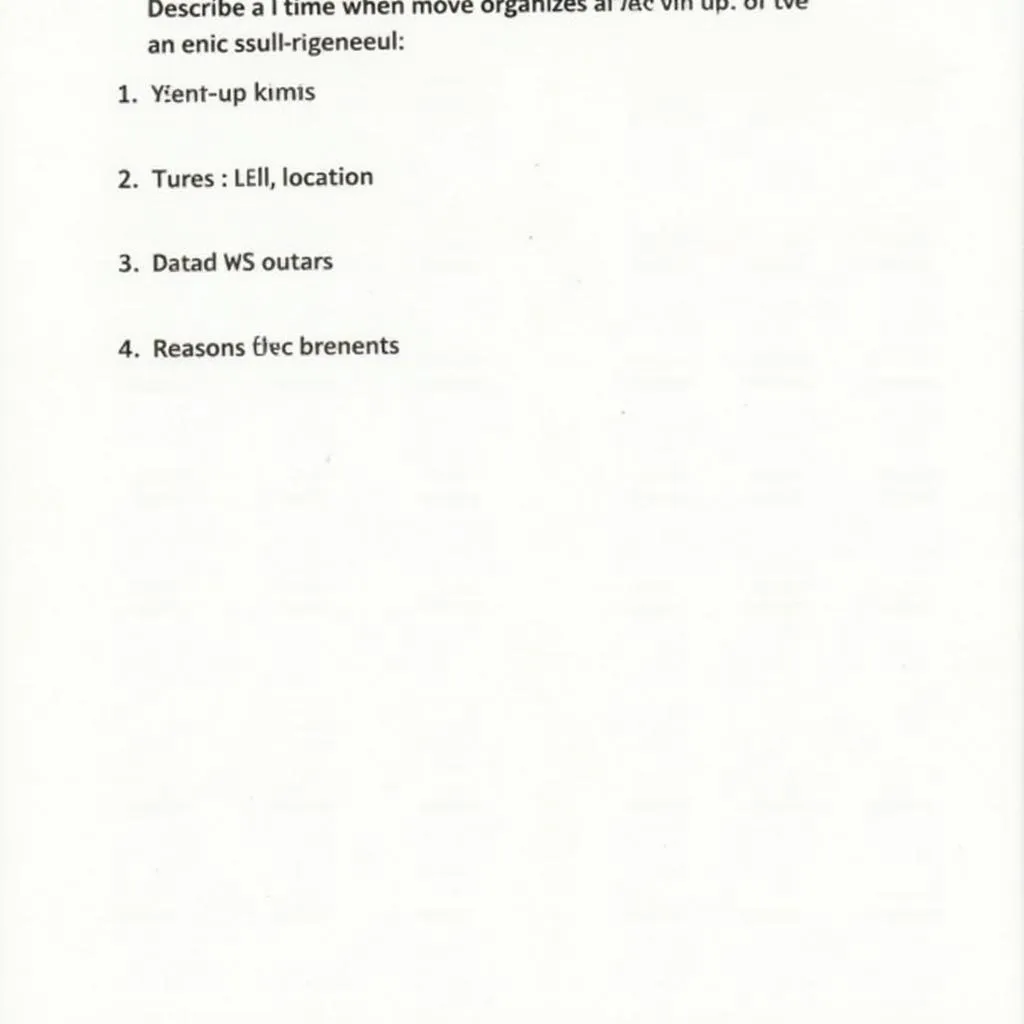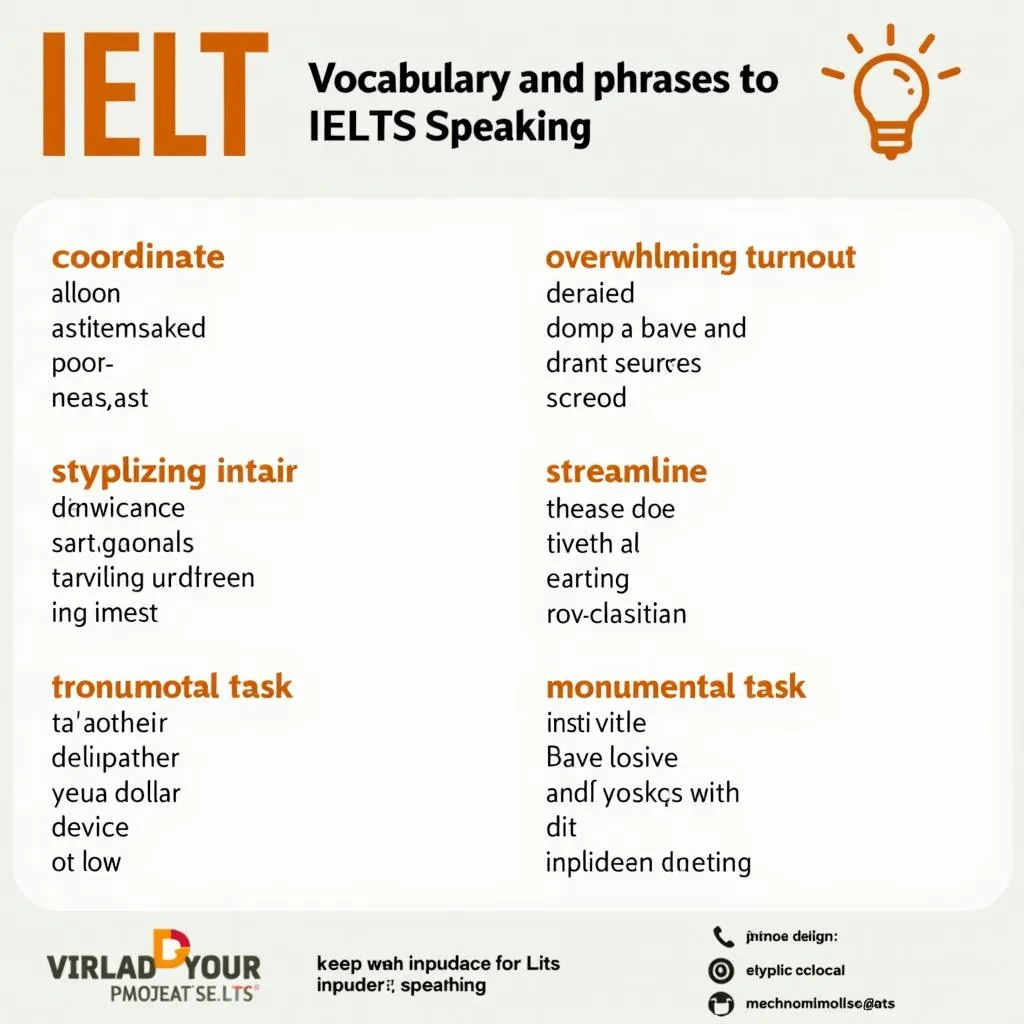Organizing an event successfully is a common topic in IELTS Speaking tests, particularly in Part 2. This theme allows candidates to showcase their planning, leadership, and problem-solving skills while demonstrating their English proficiency. As an experienced IELTS examiner, I’ve noticed this topic’s frequent appearance in past exams and predict its continued relevance in future tests.
Table Of Contents
Part 1: Introduction and Interview
In this section, the examiner may ask general questions about event planning and organization. Here’s an example question with a suggested answer:
Examiner: Do you enjoy organizing events?
Candidate: Absolutely! I find organizing events to be both challenging and rewarding. There’s something thrilling about seeing all the pieces come together, from planning the details to watching guests enjoy themselves. It’s like solving a complex puzzle, which I find immensely satisfying.
Describe a time when you worked with a team is another common topic that often comes up in IELTS Speaking tests. It’s closely related to event organization, as most successful events require effective teamwork.
Part 2: Long Turn
Cue Card
Describe a time when you organized an event successfully.
You should say:
- What the event was
- When and where it took place
- Who was involved
- Why you consider it successful
 IELTS Speaking Cue Card: Successful Event Organization
IELTS Speaking Cue Card: Successful Event Organization
Sample Answer (Band 8-9)
I’d like to talk about a charity fundraiser I organized last year for a local animal shelter. The event took place on a sunny Saturday afternoon in June at the city’s central park. It was a large-scale affair that involved coordinating various activities, including a pet adoption drive, a silent auction, and a series of live performances by local musicians.
The planning process began about three months prior to the event. I assembled a team of dedicated volunteers, each assigned specific roles such as marketing, logistics, and vendor management. We collaborated closely with the animal shelter staff to ensure their needs were met and that the event would effectively showcase their work.
On the day of the event, we had an overwhelming turnout, with over 500 attendees. The atmosphere was electric, with families enjoying the activities and many people showing interest in adopting pets. We raised a substantial amount of money through ticket sales, the auction, and direct donations.
I consider this event a resounding success for several reasons. Firstly, we exceeded our fundraising goal by 30%, providing crucial financial support to the shelter. Secondly, ten animals found new homes that day, which was incredibly heartwarming. Lastly, the event significantly raised awareness about animal welfare in our community, as evidenced by the increased volunteer sign-ups and donations in the following weeks.
Organizing this event was a monumental task, but seeing the positive impact it had on both the animals and our community made all the hard work worthwhile. It was a gratifying experience that taught me valuable lessons about leadership, time management, and the power of community engagement.
Follow-up Questions
Examiner: What challenges did you face while organizing this event?
Candidate (Band 8-9): The main challenge was coordinating the diverse elements of the event simultaneously. We had to ensure that the live performances didn’t interfere with the adoption process, while also managing the silent auction logistics. Additionally, securing sponsorships was initially daunting, but we overcame this by crafting compelling proposals that highlighted the event’s community impact. Lastly, we faced a last-minute venue change due to unexpected park maintenance, which required quick thinking and efficient communication with all stakeholders.
Candidate (Band 6-7): We had some problems with organizing everything at the same time. It was hard to make sure the music didn’t bother the animals or the people trying to adopt them. Getting sponsors was also difficult at first, but we managed to convince some local businesses to help. We also had to change the location at the last minute because of some work being done in the park, which was stressful.
Part 3: Two-way Discussion
Examiner: How do you think technology has changed the way events are organized?
Candidate (Band 8-9): Technology has revolutionized event organization in numerous ways. Firstly, digital platforms have streamlined the planning process, allowing organizers to collaborate remotely and in real-time. Tools like project management software and shared cloud documents have enhanced efficiency and communication among team members. Secondly, social media has transformed event promotion, enabling organizers to reach a wider audience more cost-effectively than traditional advertising methods. Additionally, event apps and QR codes have improved attendee experience by providing easy access to schedules, maps, and interactive features. Lastly, data analytics now allow organizers to gain valuable insights into attendee behavior and preferences, helping to refine future events. However, it’s worth noting that while technology offers many advantages, it also requires organizers to be more tech-savvy and vigilant about data security.
Candidate (Band 6-7): Technology has made organizing events much easier these days. We can use computers and phones to plan things together, even if we’re not in the same place. Social media is really good for telling people about events. There are also apps that help people at the event find information easily. We can learn a lot about what people liked or didn’t like using technology after the event. But organizers need to be good with technology to use all these tools properly.
Describe a time when you had to complete a task under time pressure is another relevant topic that often comes up in IELTS Speaking tests. Event organization frequently involves working under tight deadlines, making this a closely related theme.
Key Vocabulary and Phrases for High Scores
-
Coordinate /kəʊˈɔːdɪneɪt/ (verb): To organize the different elements of a complex activity or organization so that they work together effectively.
Example: “I had to coordinate various teams to ensure the event ran smoothly.” -
Logistical /ləˈdʒɪstɪkl/ (adjective): Relating to the careful organization of a complicated activity or event involving many people.
Example: “The logistical challenges of organizing a large-scale event were significant.” -
Overwhelming turnout /ˌəʊvəˈwelmɪŋ ˈtɜːnaʊt/ (noun phrase): A surprisingly large number of people attending an event.
Example: “We were thrilled with the overwhelming turnout at our charity gala.” -
Streamline /ˈstriːmlaɪn/ (verb): To make a system, organization, or process more efficient and effective by employing faster or simpler working methods.
Example: “We used project management software to streamline our planning process.” -
Monumental task /ˌmɒnjʊˈmentl tɑːsk/ (noun phrase): A very large and important piece of work that requires a lot of effort.
Example: “Organizing the international conference was a monumental task that took months of preparation.”
 Key Vocabulary for IELTS Speaking: Event Organization
Key Vocabulary for IELTS Speaking: Event Organization
Examiner’s Advice
To achieve a high score in the IELTS Speaking test when discussing event organization:
- Use a wide range of vocabulary specific to event planning and management.
- Demonstrate your ability to speak at length by providing detailed examples and explanations.
- Show your capacity to discuss abstract ideas, especially in Part 3, by considering broader implications of event organization.
- Practice describing your experiences with clarity and coherence, focusing on your role and the outcomes.
- Incorporate idiomatic expressions and advanced grammatical structures naturally in your responses.
Remember, Describe a time when you were proud of an achievement can often overlap with successful event organization. Be prepared to discuss your feelings of pride and accomplishment when describing your event planning experiences.
By following these guidelines and practicing regularly, you’ll be well-prepared to discuss event organization confidently in your IELTS Speaking test, potentially boosting your chances of achieving a high band score.


